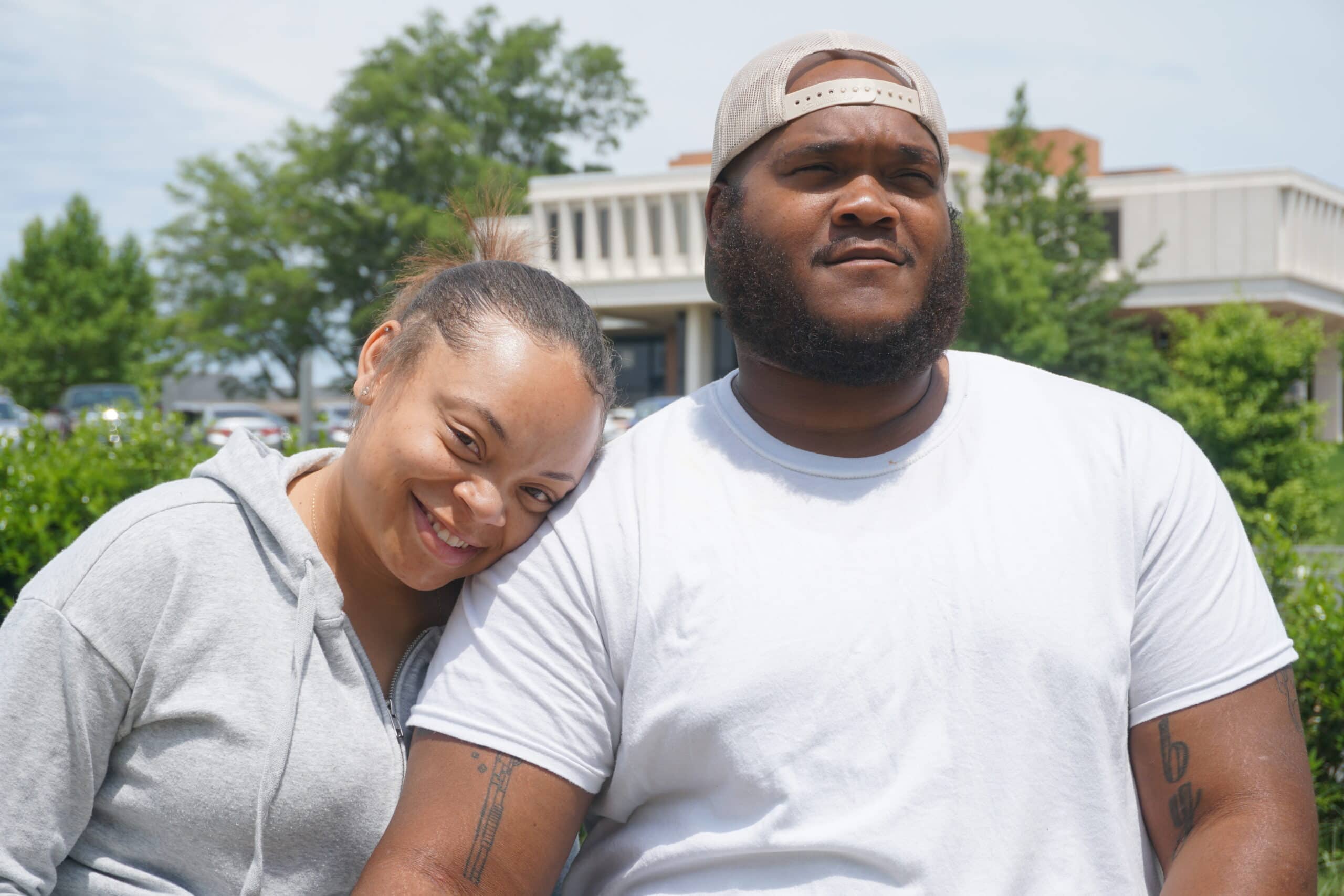View Larger Image

Jada Mosby and her husband, T.J., were married in 2019 and welcomed baby A.J. in November. The couple says that sickle cell is another part of their lives together.
Image by Benjamin Waldrum
New Mother with Sickle Cell Comes to UAMS to “Get Rejuvenated and Go Back to Life”
| Sickle cell disease is just another part of everyday life for Jada Mosby, 24. And as a new mother, she doesn’t plan on letting it slow her down anytime soon.
“It’s just part of my life,” she said. “It is my life, but it’s nothing to me.”
As a baby, Mosby was diagnosed with sickle cell beta thalassemia, which is a milder form of sickle cell anemia. Affected people have different mutations in genes that produce hemoglobin, the iron-containing protein in red blood cells that carries oxygen throughout the body.
Symptoms for sickle beta thalassemia range from very mild to somewhat severe, because hemoglobin production varies from person to person. More severe symptoms resemble those of sickle cell anemia, including anemia, pain crises and increased risk of infection.
Mosby’s symptoms are mild. She had very few pain crises as a child and has only been experiencing them recently, as she adjusts to more drawn-out apheresis treatments, which replace her red blood cells with new ones. Usually, she gets these treatments every four weeks, but they was recently extended to six weeks because her blood counts have been good.
“Before [May] I haven’t had a pain crisis since I was little,” Mosby said. “And when they switched me over to six weeks, that’s when I started getting pain crises. I think it was just because they were switching me out, making me push a little farther.”
The treatments have their ups and downs. She takes two pills a day, mostly to regulate the iron in her body after apheresis. Her husband, T.J., also 24, stays with her through each apheresis session. They commute from Conway, and it takes time out of their daily life. But Mosby takes it all in stride.
“I can just come [to UAMS] and take a nap – I call it my resting day,” she said, laughing. “Just get rejuvenated and go back to life.”
Overall, Mosby said she doesn’t have too many complaints.
“My doctors have kept me well, so I haven’t really have too many problems,” she said. “I know for other sickle cell patients it’s a little different, but for me, as long as I get my blood transfusions, and I drink water, taking the medicine, then I’m good.”
She married her husband in 2019. They’ve known each other since they were children because their mothers were best friends growing up, Mosby said.
“Even when we weren’t together, his mom talked to him a lot about [sickle cell disease] before he even knew, before I ever even told him,” Mosby said. “His mom kind of scoped him because she’s a nurse. She let him know everything before we even got together, which is a good thing.”
“Honestly it’s easy to support her, just because I love her,” said T.J. Mosby.
“To me, it’s just a regular part of life,” he said. “To me it’s just, as a man, you do what you need to do to make the family as good as it can be, and to me this is just another part of it.
“I’m blessed now to have a job to where, I can leave once a month and, or if she’s not feeling good tomorrow I can say ‘Hey, I need to come at lunch instead of coming in the morning.’ So, it’s pretty good. For our scenario, I think it’s the best as it can be.”
Their family is growing, too. In November, the couple welcomed baby A.J. into the world. He’s now 8 months old, and Jada Mosby said having him was “a miracle.”
There are risks for expecting mothers with sickle cell. Complications during pregnancy are more likely, including more frequent and severe pain crises and a higher risk of preterm labor and a low birth-weight baby. But the whole pregnancy went smoothly, Mosby said.
“It was a shocker,” she said. “Some doctors don’t believe in having a baby when you have sickle cell. I know a couple years back I was told I couldn’t have babies at all. I say it was a miracle, because I never thought I would have a baby.”
Mosby first came to the UAMS Adult Sickle Cell Clinical Program as soon as she realized she was pregnant. She transitioned from the program at Arkansas Children’s once she aged out.
“I get the same treatment here as Children’s,” Mosby said. Her husband said they spend less time at UAMS than they did at Children’s, which gets them back to their lives faster.
Today, the couple is focused on living life to the fullest with little A.J. Mosby just started a job with the Arkansas Department of Human Services as a clerical worker. Regular activities outside of work include fishing, going to the shooting range and the park, or swimming.
With T.J. and now A.J. by her side, Mosby said she’s in a good place these days.
“My future was having a baby, and I’ve already had him,” she said. “I’m content with how I am right now. I had my baby, I’m good.”